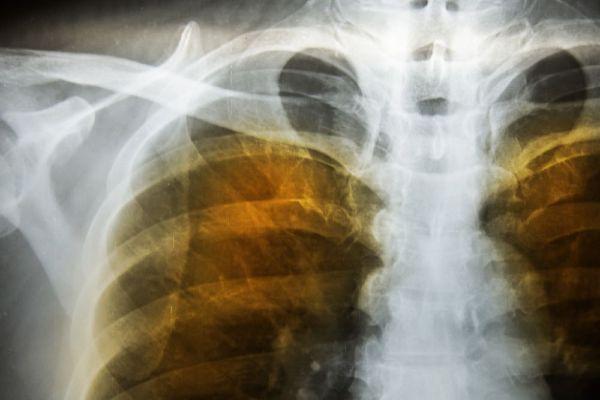It is estimated that over half a million people in Ireland have Chronic Obstructive Pulmonary Disease (COPD).
And half of those who have it are never diagnosed.
COPD is the name for a collection of lung diseases including chronic bronchitis, emphysema, and chronic obstructive airways disease, says the HSE.
It is often mislabelled as ‘the smoker’s disease’ because of the associated, deep cough. However, Joy Cassidy, who has been diagnosed with COPD, says this is not always the case.
“The worst thing of all is when I say I can’t do something because of COPD, people say ‘oh it’s the smoker’s disease’ and I think they’re getting wrongly blamed. I think they’ve just got a proneness to it because I know people that have smoked all their lives and don’t have COPD.
“In fact, my dad died at age 82 and he smoked since he was 10 and he had nothing wrong with his lungs at all.”
Joy has never smoked a day in her life and never spent time with any friends that smoked as well. “I tend to stay away from smokers,” she said.
“What I didn’t like about smoking is that awful cough that my dad used to have. And now I’ve got the cough but I’ve never did the smoking bit.”
In honour of upcoming World COPD day on November 21, we asked her to share her experience with the disease to help raise awareness.
As a mum and grandmother, she (like most people) wasn’t diagnosed until later on at life at 67-years-old. She came down with what she thought was a bad case of the flu when she suddenly found herself unable to breath.
“I couldn’t breathe and had to go to the out-of-hours doctor in Drogheda. She prescribed me an inhaler along with antibiotics. So I went to my doctor [the next day], and he sent me for a chest x-ray. And lo and behold, there was COPD.
“I didn’t know if I had it but I wondered if I did,” she said. The only reason she knew about the disease is because her mum had it, but she thought that was due to the damp environment her mum grew up in or due to her dad’s constant smoking.
“I’ve never had chest infections but anytime I went to the doctor with a sore throat or some other infection, I would ask him to check the chest out. I’d say ‘my mother had COPD’ and ‘you’re fine’ is all I got out of the doctors. So I left it be.”
COPD can affect you in a number of ways. Joy has found it particularly difficult whenever she walks up an incline, is sick, or does strenuous physical activity. An avid water aerobics enthusiast, she used to wonder why she couldn’t keep up when everyone else was jumping in the water.
She thought it was maybe her age, a natural process of aging, which is what most people falsely attribute symptoms of COPD to.
“A lot of people just put it to age that you can’t keep up,” she explained. “ Before my mum got diagnosed, she’d get out of breath when she walked up a hill or tried to hurry. It’s not just your age. You can’t cure it but you can make life a little bit easier for yourself.”
And while smoking can cause COPD, Joy is living proof that there are other major factors at play. It could be more nature than nurture if you have genes for susceptible lungs.
“I grew up in London. And I remember one really bad fog when the fog was so thick that if you put your hand out in front of you, you couldn’t see it. It was that bad. But my school friends that all lived in the same area in London haven’t got COPD,” she said.
“You go down every avenue. Maybe I got it when I was around my dad, maybe my lungs were prone to it. But I’ve eliminated everything, and the only thing I can really think of is that I’ve a genetic trace for it.”
Joy has a more mild version of COPD and only requires two inhalers for treatment - one she must breathe in twice a day and a ventolin one she uses if she does more strenuous exercise like walking, shopping, or swimming.
She just has to take one puff about ten minutes before exercising. “It makes all the difference,” she said.
“You start to worry that your daughters might get it later on in life, but they’re aware of it. Anytime they get a medical checkup they will always ask. One of them has had a spirometry test and it was fine.”
The reason many go undiagnosed, she says, is because doctors do not perform enough spirometry tests. It’s not part of a normal routine check up.
When asked about advice for people who are diagnosed with COPD, Joy made a few helpful recommendations:
1. Try not to be overwhelmed by the world ‘chronic’.
“When you’re told you have something chronic, you think it’s a lot worse. It’s when you realise that this is as good as it’s gonna get, that’s when it gets harder to come to terms with, but people live quite a long while with it. “
2. Find a local support group. (Many have online Facebook groups and they can be a big help.)
“It’s great to meet other people and we’re all at different stages. It’s vitally important. I find there is a lot of support within the group on how to use your medication. It’s learning from others and their experiences.”
3. Stay active, especially if you’re in the earlier stages.
Joy is in her 70s and makes time for aqua aerobics, regular walking, and gardening too. But she makes sure she can always take a break if need be so that the fatigue doesn’t set in.
COPD Support Ireland offers a place of support for those diagnosed as well as more management tips, including quitting smoking, eating well, knowing your medications, avoiding flare-ups, and minding your feelings.
Joy hopes, along with many others, that COPD will become more widely recognised in Ireland because “when you get an early diagnosis, it slows down the progression.”












